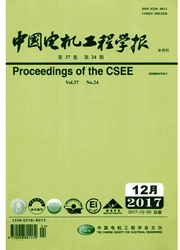

 中文摘要:
中文摘要:
研究纳米复合聚酰亚胺薄膜热刺激电流(TSC)测试的影响因素和陷阱参数计算方法,并对不同样本和不同老化条件下的TSC结果进行分析。通过对不同的测试条件(包括不同的数据平滑方法、极化温度,极化电压、极化时间等因素)的TSC曲线特征分析,研究不同测试条件对纳米复合绝缘样本TSC测量结果的影响,并用高斯拟合对TSC曲线进行峰分离和陷阱参数计算。根据这些结论,对不同样本和老化条件下的热刺激电流特征进行分析和比较,得到热刺激电流和PWM脉冲电压下绝缘微观特征之间联系。结果表明,测试条件对TSC结果有明显影响,合适的测试方法有助于研究纳米复合聚酰亚胺薄膜在PWM电压作用下的微结构变化。
 英文摘要:
英文摘要:
The problem of thermally stimulated current (TSC) measurement on nanocomposites polyimide is addressed. Effects of different test condition including smoothing method, pole temperature, pole time and pole voltage on TSC measurement are investigated in order to find a proper measurement method on nanocomposites polyimide film. In addition, Gauss fitting is applied to separate TSC curve peak and compute trap parameters. Based on these methods, TSC curve characteristic of different materials, different aging condition and different aging time were compared. Depending on these features of TSC, the relationship between features of TSC and microstructures of materials is abtained. Results of TSC on nanocomposites specimen are obviously influenced by different test condition, and proper measurement method will contribute to study the microstructure change of nanocomposites materials under PWM voltage.
 同期刊论文项目
同期刊论文项目
 同项目期刊论文
同项目期刊论文
 期刊信息
期刊信息
